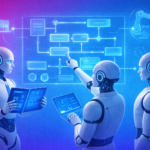AI Agents Beyond Customer Support
While AI agents have gained significant traction in customer-facing roles, their potential to revolutionize internal business operations is equally transformative. In 2025, forward-thinking companies are increasingly leveraging the power of AI agents to streamline processes, enhance employee experiences, and boost efficiency across various departments, from Human Resources and IT to project management and beyond. This post explores how AI agents are being deployed internally to optimize workflows and empower employees.
AI Agents in HR: Automating Employee Queries and Onboarding
Human Resources departments often handle a high volume of repetitive employee inquiries. AI agents can significantly alleviate this burden by:
- Answering FAQs: Agents can provide instant answers to common questions regarding company policies, benefits, payroll, and HR procedures, reducing the workload on HR staff.
- Automating Onboarding: AI agents can guide new hires through the onboarding process, providing necessary information, collecting paperwork, and answering their initial questions, ensuring a smoother and more efficient experience.
- Managing Leave Requests: Employees can submit leave requests through an AI agent, which can automatically check eligibility, update calendars, and initiate approval workflows.
- Facilitating Training and Development: AI agents can deliver training modules, track employee progress, and answer questions related to professional development programs.
- Gathering Employee Feedback: Agents can conduct surveys and gather feedback on various aspects of the employee experience, providing valuable insights for HR initiatives.
By automating these tasks, AI agents free up HR professionals to focus on more strategic initiatives like talent acquisition, employee relations, and organizational development.
IT Support Agents: Streamlining Help Desk Requests
IT departments are often overwhelmed with support requests. AI agents can streamline help desk operations by:
- Triaging Tickets: Agents can analyze incoming support tickets, categorize them based on urgency and type, and route them to the appropriate IT personnel.
- Providing Initial Troubleshooting: AI agents can guide employees through basic troubleshooting steps for common IT issues like password resets, software glitches, and network connectivity problems.
- Answering Technical FAQs: Agents can provide instant answers to frequently asked technical questions, reducing the number of tickets escalated to human IT staff.
- Automating Software Installations and Updates: In some cases, AI agents can guide users through or even automate the installation and updating of software.
- Providing Self-Service Resources: Agents can direct employees to relevant knowledge base articles, tutorials, and documentation to resolve issues independently.
Implementing AI-powered IT support agents leads to faster resolution times, reduced strain on IT resources, and improved employee productivity by minimizing downtime.
AI Agents for Project Management and Workflow Automation
Beyond HR and IT, AI agents are finding valuable applications in project management and general workflow automation:
- Task Management: Agents can help project managers assign tasks, track progress, send reminders, and identify potential bottlenecks.
- Meeting Scheduling and Coordination: AI agents can automate the process of scheduling meetings, finding optimal times for participants, and sending out calendar invites.
- Document Management: Agents can assist with organizing, retrieving, and routing documents within internal workflows.
- Data Entry and Processing: AI agents can automate repetitive data entry tasks, freeing up employees to focus on more analytical and strategic work.
- Workflow Automation: Agents can trigger automated workflows based on specific events or conditions, ensuring tasks are completed efficiently and consistently.
By automating these operational tasks, AI agents contribute to increased efficiency, reduced errors, and improved collaboration across teams.
Conclusion: How Businesses Can Leverage Agents Internally
The adoption of AI agents for internal business operations presents a significant opportunity for organizations to enhance efficiency, improve employee experiences, and free up valuable human capital for more strategic endeavors. To effectively leverage AI agents internally, businesses should:
- Identify Repetitive and Time-Consuming Tasks: Analyze workflows across different departments to pinpoint areas where AI agents can provide the most value.
- Choose the Right AI Agent Platform: Select a platform that offers the necessary features, integration capabilities, and security for your internal needs.
- Focus on User Experience: Design intuitive and user-friendly interfaces for your internal AI agents to encourage adoption.
- Integrate with Existing Internal Systems: Ensure seamless integration with HRIS, IT help desk software, project management tools, and other relevant platforms.
- Provide Adequate Training and Support: Educate employees on how to interact with the AI agents and provide ongoing support to address any questions or issues.
- Start Small and Iterate: Begin with implementing AI agents for specific, well-defined tasks and gradually expand their scope based on success and feedback.
By strategically deploying AI agents within their internal operations, businesses in 2025 can unlock significant gains in productivity, efficiency, and employee satisfaction, ultimately contributing to a more agile and effective organization.





